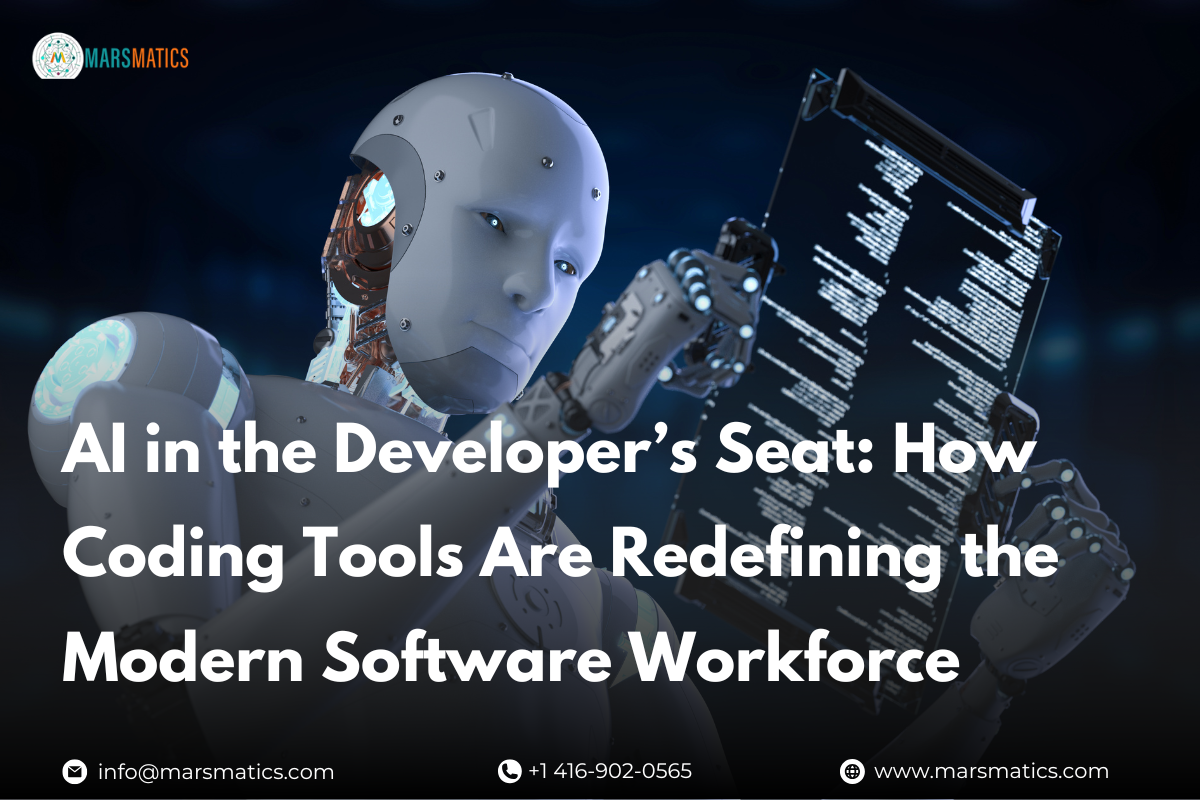AI in the Developer’s Seat: How Coding Tools Are Redefining the Modern Software Workforce
You no longer need to write every line of code yourself to be a developer in 2025. With artificial intelligence now firmly embedded in software workflows, developers are finding themselves in a new kind of seat, one where they guide, oversee, and refine what machines produce. AI-powered coding assistants like GitHub Copilot, Amazon Q Developer, and OpenAI’s Codex are transforming the industry from the inside out.
But what does this shift mean for the developer workforce? Is AI replacing developers, or simply reshaping their role? This blog explores how AI tools are revolutionizing the way software is written, how companies are adapting, and what the future of coding looks like.
The Rise of AI Coding Tools
AI tools for coding have grown rapidly in recent years, with over 92% of developers reporting some use of AI tools in their workflow, according to a 2024 Stack Overflow Developer Survey. Platforms like GitHub Copilot help autocomplete code, suggest functions, and even explain snippets of code in plain English. These tools are not only helping junior developers get up to speed, but are also accelerating output for senior engineers.
At the National Australia Bank, Amazon’s Q Developer AI assistant is already generating about 50% of production code, according to a recent Business Insider article. This marks a radical shift toward a new trend dubbed “vibe coding” — where the developer describes what needs to be done, and the AI handles much of the actual coding.
Also Read: Tips for Developers to Adapt to AI Tools
Changing Developer Roles and Skills
With AI doing more of the repetitive work, developers are transitioning from coders to curators. Instead of spending hours writing boilerplate code, they’re now:
- Reviewing AI-generated code for bugs or inefficiencies
- Optimizing logic and structure
- Guiding the AI using high-level prompts
- Integrating AI-generated components into broader software systems
This shift means that while technical coding skills are still essential, other capabilities are becoming just as important—like critical thinking, code review, system architecture, and communication. According to the Wall Street Journal, companies like Tapestry and KeyBank have found that AI tools help teams do more with fewer engineers. However, the focus has moved from typing fast to thinking clearly and collaborating effectively.
Benefits of AI in Software Development:
- Faster Development Times:
AI can suggest or generate code snippets in seconds, cutting development time significantly. - Increased Efficiency:
Developers can now manage larger, more complex projects without increasing headcount. - Fewer Repetitive Tasks:
AI handles the boilerplate and predictable code—freeing up developers to work on more interesting challenges. - Better Onboarding for Juniors:
AI tools serve as in-line documentation and teaching tools, helping less experienced coders understand and contribute faster. - Enhanced Collaboration:
By simplifying the coding process, cross-functional teams (like product managers or QA testers) can better understand and contribute to development discussions.
Also Read: The Pros and Cons of AIaaS
Challenges and Concerns:
Despite the benefits, this AI-led transformation comes with a few concerns:
- Over-Reliance on AI:
Developers may lose touch with foundational coding skills if they rely too much on AI tools for everything.
- Security and Quality Risks:
AI doesn’t always write clean, secure code. Developers must thoroughly vet AI outputs to avoid introducing bugs or vulnerabilities.
- Job Market Uncertainty:
There’s growing anxiety about whether AI will reduce the number of developer jobs. However, most experts agree that roles will shift—not disappear.
- Ethical Implications:
Who is responsible for errors in AI-generated code? Legal and ethical frameworks are still catching up.
Also Read: What is AIaaS? A Complete Guide to Ai as a Service
What Developers Can Do to Adapt?
To stay competitive in this evolving environment, developers should:
- Learn how to prompt AI effectively (prompt engineering is already a rising skill).
- Focus on soft skills like communication and teamwork.
- Stay up-to-date on AI tools and platforms like GitHub Copilot, Replit Ghostwriter, and Amazon Q Developer.
- Improve their ability to review, test, and debug AI-generated code.
Conclusion
The world of software development is changing fast, and AI is in the driver’s seat. Tools like GitHub Copilot, Amazon Q Developer, and GPT-powered assistants are not just speeding up the process, they’re transforming how code is written and who writes it.
But rather than replace developers, these tools are opening up new opportunities. From productivity boosts to more engaging problem-solving, AI is empowering a smarter, leaner, and more strategic coding workforce.
The future of development isn’t about fighting AI—it’s about working with it.
FAQs
Q1: Will AI replace software developers?
A: No—but it will change what their job looks like. AI is more of a co-pilot than a replacement, helping with productivity and routine tasks.
Q2: What is “vibe coding” and why is it popular?
A: “Vibe coding” is a new way of working where developers describe the goal, and AI handles the coding. It’s gaining popularity for its speed and creativity.
Q3: Are companies really using AI for production code?
A: Yes. At National Australia Bank, AI writes about 50% of production code, showing it’s not just experimental—it’s mainstream.
Q4: What skills should developers focus on in an AI-first environment?
A: Developers should prioritize system design, prompt engineering, code review, and collaboration—skills AI can’t yet replace.








